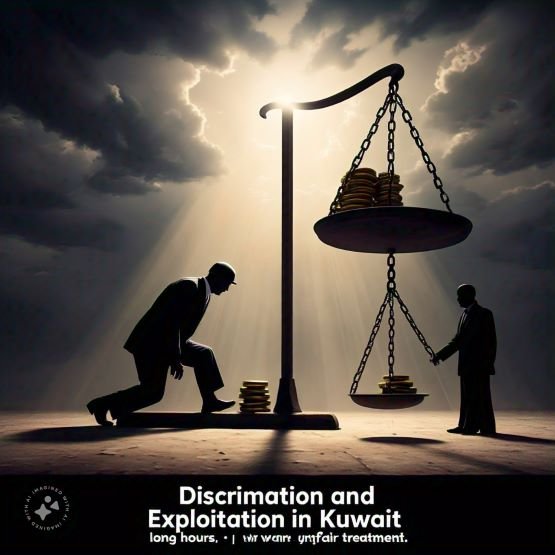
Every year, thousands of Pakistanis dream of securing lucrative jobs abroad to improve their financial situation. Kuwait, with its thriving economy and high standard of living, is often seen as an attractive destination. However, beneath the shiny surface lies a series of challenges that many Pakistani workers face once they arrive. While there are success stories, a significant number of individuals struggle due to harsh working conditions, cultural differences, and limited rights. In this blog, we will explore the major problems faced by Pakistanis while working in Kuwait, shedding light on why this job market can sometimes feel like a trap.

False Promises by Recruitment Agencies
Misleading Job Offers
One of the first hurdles Pakistani workers face is false promises made by recruitment agencies. These agencies often paint a rosy picture, claiming high salaries, excellent work environments, and plenty of benefits. However, upon arrival, many workers find themselves in low-paying jobs with long working hours and little to no job security. Consequently, this initial deception sets the tone for a challenging experience.

Cultural and Language Barriers
Differences in Work Ethics
Another significant problem is the cultural and language barriers. Although both Pakistan and Kuwait share Islamic traditions, the cultural nuances differ greatly. For instance, misunderstandings often arise due to different work ethics and expectations.
Language Challenges
Additionally, not knowing Arabic can make communication with employers and colleagues difficult, further isolating workers. As a result, Pakistani employees often find themselves struggling to adapt to their new environment.

Harsh Working Conditions
Extreme Weather Challenges
Kuwait’s extreme climate is another major challenge. During the summer, temperatures can soar beyond 50°C, making outdoor work incredibly grueling.
Lack of Enforcement of Labor Laws
Unfortunately, many Pakistani laborers are employed in construction and other physically demanding sectors, where they are directly exposed to the scorching heat. Moreover, despite labor laws aimed at protecting workers, enforcement is often weak, leaving many vulnerable to unsafe conditions.

Limited Legal Protections
Exploitation of Worker Ignorance
While Kuwait does have labor laws in place, the reality is that many Pakistani workers lack awareness of their rights. Employers often exploit this ignorance by withholding passports, delaying salaries, or even imposing unreasonable penalties for minor infractions.
Kafala System Constraints
Furthermore, the “kafala” system, which ties a worker’s legal status to their employer, makes it difficult for workers to switch jobs or report abuses without risking deportation.

High Cost of Living vs. Low Wages
Financial Struggles
Although Kuwait is one of the wealthiest countries in the world, the cost of living is extremely high. From housing to food and transportation, expenses can quickly drain a worker’s earnings.
Limited Savings Opportunities
Unfortunately, many Pakistani workers are paid low wages that barely cover their basic needs, let alone allow them to send money back home. This financial strain often leads to frustration and disappointment.

Social Isolation and Homesickness
Emotional Impact of Isolation
Being away from family and friends can take a significant emotional toll on workers.
Lack of Social Support
The long working hours and lack of social support make it difficult for Pakistani workers to build a community or maintain a work-life balance. Consequently, many suffer from severe homesickness and loneliness, further exacerbating their struggles.

Discrimination and Exploitation
Unequal Treatment
Sadly, discrimination is a harsh reality for many foreign workers in Kuwait. Pakistanis, along with other South Asians, are often treated as second-class citizens.
Limited Career Growth
They may face prejudiced behavior from both employers and locals. This discrimination can manifest in unfair pay, lack of career growth opportunities, or even verbal and physical abuse.

How to Avoid These Pitfalls
Practical Steps for Success
To avoid falling into these traps, Pakistani workers should take several precautions before heading to Kuwait. Here are some practical steps:
- Research and Verify Job Offers: Always verify job offers through reliable sources, such as government-approved recruitment agencies or official labor departments. Avoid relying solely on promises made by middlemen.
- Understand Your Rights: Familiarize yourself with Kuwait’s labor laws and your contractual rights. Knowledge is power, and being aware of your entitlements can help you avoid exploitation.
- Learn Basic Arabic: Knowing basic Arabic phrases can go a long way in easing communication and helping you integrate into the workplace. It can also reduce misunderstandings with employers and colleagues.
- Prepare for the Climate: Equip yourself with proper clothing and hydration strategies to cope with Kuwait’s extreme weather, especially if you’re working outdoors.
- Save and Budget Wisely: Plan your finances carefully, keeping in mind the high cost of living in Kuwait. Saving and budgeting can help you avoid financial stress.
- Seek Support Networks: Connect with fellow Pakistani workers or community organizations in Kuwait. Building a support system can help combat feelings of isolation and provide valuable advice on navigating challenges.
The Way Forward
Improving the Situation for Workers
Despite these challenges, there are steps that can be taken to improve the situation for Pakistani workers in Kuwait. Firstly, stricter regulations and monitoring of recruitment agencies are essential to prevent false promises and exploitation. Secondly, providing language and cultural training to workers before they leave Pakistan could help them adapt more quickly. Lastly, diplomatic efforts to negotiate better labor protections for Pakistanis in Kuwait are crucial.
Conclusion
While Kuwait may seem like a land of opportunity, the reality for many Pakistani workers is far from ideal. The major problems faced by Pakistanis while working in Kuwait, including harsh working conditions, limited rights, and cultural barriers, highlight the need for caution. Before embarking on such a journey, it is essential for workers to research thoroughly, understand the risks, and prepare accordingly. Only then can they make informed decisions and avoid falling into the traps of Kuwait’s job market.




